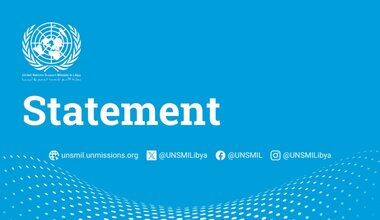Excerpts from Leon’s Comments to the Media after Briefing the Security Council on Libya
29 April 2015 - I have just briefed the Security Council on the situation in Libya. First of all ... this chaos is what explains dramas as the ones we have seen recently: death in the Mediterranean Sea, hundreds of migrants traveling to south Italy and other countries, the killing in the south of the country of 30 Ethiopian Christian by Daesh, together with other crimes and attacks by Daesh as ones happened recently on some embassies in Tripoli.
Watch the full comments of SRSG Leon to the media:
In this context, the United Nations Mission for Libya is proposing some ideas in a draft agreement proposal that has been sent two days ago to the parties.
I have informed about the main elements of this proposal where I think the areas affecting more both camps and the reactions, because you know
We have already reactions from both parties, some of them are critical, some of them are negative and, of course, it is something we can expect in such complex process as it is the one in Libya. I explained to the Council that this is a draft so these negotiations are work in progress. We are in contact with the parties. We are listening to them, of course, and trying to understand how this draft can be improved and how we can reach this consensus we want as a political solution in Libya.
We all know very well and the actors involved in the dialogue know very well that there is no military solution. So, the fighting you can see in the country is mainly affecting the political dialogue and intended to hamper the political dialogue. This is what both of these actors are trying to do and this is why I explained to the Security Council that we need to start with the security track as soon as possible, we are trying to start first meeting as soon as next week.
There are two tracks that have not started to work yet, one is the security track. We would like to have face to face meetings as soon as possible and the other one is tribal leaders that should start to meet also soon.
So, we have discussed with the Security Council these issues. They have expressed concerns, first of all about the timing. The international community would like to see an agreement in Libya before Ramadan. Ramadan as you know starts on June 17. This is the ideal framework and this is what I heard today in the Council. Concerns about how to overcome this chaos, given the huge concern of the international community about terrorism, about migration, chaos in Libya is a huge problem for its own citizens but it is also a huge problem for the international community.
How to help this process, how at the same time effectively fighting these threats, this has been repeated by many of the ambassadors today in the Council, so these are the main elements.
Q: You talked about the draft agreement by it has been already rejected by one of the government, the one in Tripoli…
Leon: I have had couple of conversations with them. What I’ve heard is that some parts of the agreement are OK, including some of the most important parts of the agreement. This does not mean that they can accept everything in those parts, but there are those that require more work, I think there is a genuine interest in improving the proposal … these negative reactions, you have all kinds of actors, sectors so you have to see where some of these reactions are coming from, let me insist that in my conversation with people representing that side in the dialogue, it has not been so negative, it has been critical, they clearly want their share of governance of power to be improved in future drafts, but also they were positive about other parts.
Q: You talked about 80% agreement, what are the main obstacles
Leon: …The only sort of hope is that we are working hard and we have more and more people in Libya supporting…let me add another element, these fighting everywhere in Libya is a very important concern for the UN and the international community. It is proving time and again that there won’t be in Libya a military solution. At least for the moment, you can’t see any of the military actors strong enough to impose completely on the other. So, it is true that there is fighting everywhere in the country, but at the same time it is enforcing our argument that the only solution is political. Even some of the people who are fighting when you talk to them they tell you we know there will be a solution but while there is no political solution we have to improve our position… It will be difficult to imagine just few months ago that both sides will be discussing a paper and this is what we are doing today so this is the sort of hope but let me very cautious about possibilities for the agreements.
 United Nations Peacekeeping
United Nations Peacekeeping UN
UN








